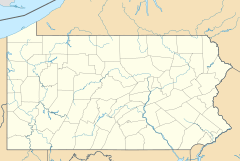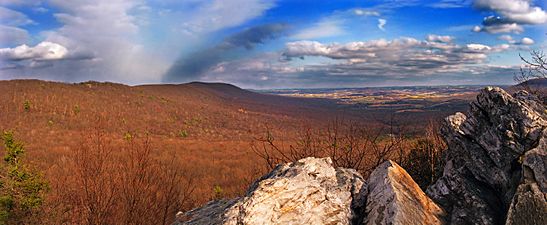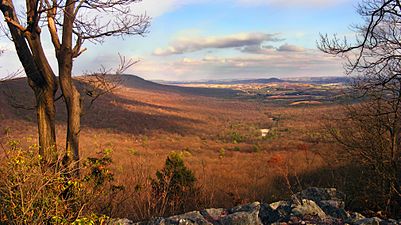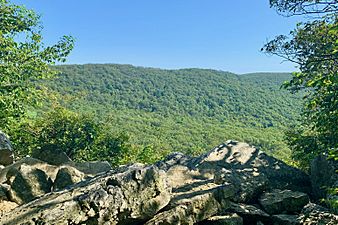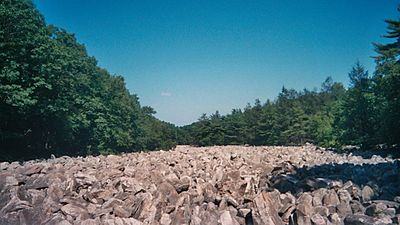Hawk Mountain Sanctuary facts for kids
Quick facts for kids Hawk Mountain Sanctuary |
|
|---|---|
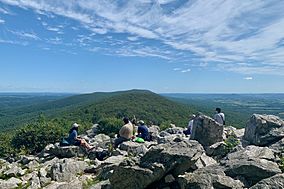
Birdwatching at the North Lookout
|
|
| Location | Berks / Schuylkill counties, Pennsylvania, USA |
| Nearest city | Orwigsburg, Pennsylvania |
| Area | 2,600 acres (1,100 ha; 11 km2) |
| Established | 1934 |
| Visitors | 60,000 (in 2008) |
| Governing body | Hawk Mountain Sanctuary Association |
| Designated: | 1965 |
|
Pennsylvania Historical Marker
|
|
| Designated: | September 14, 2019 |
| Location: | Hawk Mountain Road, at path to North Lookout |
Hawk Mountain Sanctuary is a special place in eastern Pennsylvania. It is a safe home for wild birds, especially raptors. These are birds like hawks, eagles, and falcons. The sanctuary is located along a path birds use to fly south for winter. This path is called the Appalachian flyway.
Every late summer and fall, about 20,000 hawks, eagles, and falcons fly past the lookouts here. Staff and volunteers count these birds. This helps them learn about how many raptors there are in North America. Hawk Mountain has the longest record of counting raptor populations in the world. This information is very important for protecting these amazing birds.
Contents
Exploring Hawk Mountain
The sanctuary is found on a part of the Blue Mountain chain called Hawk Mountain. When you visit, you can find a Visitor Center. It has a shop and other helpful facilities. There is also parking nearby.
Next to the Visitor Center is a special garden. It has plants that grow naturally in the area. A fence protects these plants from deer.
Hiking Trails and Lookouts
A trail called the Lookout Trail is about 1 mile (1.6 km) long. It goes from the Visitor Center to several spots where you can watch raptors. The most popular spots are the South Lookout and the North Lookout.
- The South Lookout is about 1,300 feet (396 meters) high.
- The North Lookout is even higher, at 1,521 feet (464 meters). From here, you can see a wide view that stretches up to 70 miles (113 km)!
There are nine different trails for hikers at Hawk Mountain. They have different difficulty levels. Some of these trails even connect to the famous Appalachian Trail.
Schaumboch's Tavern
Inside the sanctuary, you can also find an old building called Schaumboch's Tavern. This historic place was added to the National Register of Historic Places in 1979.
History of Protecting Raptors
Long ago, Hawk Mountain was a popular place for people to shoot hawks. They did this for fun or to stop the birds from hunting farm animals.
In 1934, a woman named Rosalie Edge decided to protect the birds. She rented 1,400 acres (567 hectares) of land on Hawk Mountain. She then hired people called wardens to keep hunters away.
Early Conservation Efforts
The first wardens were Maurice Broun and his wife, Irma Broun. They loved birds and wanted to protect nature. They came from New England. Soon after they started, more raptors began to appear at Hawk Mountain.
In 1938, the Hawk Mountain Sanctuary Association was created. It is a non-profit group in Pennsylvania. Rosalie Edge bought the land and gave it to this association forever. This made sure the sanctuary would always be a safe place for birds.
National Recognition and Learning
In 1965, the sanctuary was named a National Natural Landmark. This means it is a very important natural area in the United States.
Many famous people have visited Hawk Mountain. One well-known visitor was Rachel Carson, a famous environmental writer.
In 2001, a new building opened at the sanctuary. It is called the Acopian Center for Conservation Learning. This was made possible by a generous person named Sarkis Acopian. Students from all over the world come here. They learn about birds (ornithology), how the environment works, and other science topics. They also get to do hands-on work.
When to See Migrating Birds
The best time to see different kinds of raptors at Hawk Mountain changes throughout the year. The times listed below are when you are most likely to see each type of bird. They are listed in the order they usually start to appear.
- Broad-winged hawk: Late August to late September
- American kestrel: Late August to early October
- Osprey: Late August to early October
- Bald eagle: Early September
- Northern harrier: Early September to early November
- Sharp-shinned hawk: Early September to early November
- Red-tailed hawk: Early September to early December
- Cooper's hawk: Late September to late October
- Merlin: Early October
- Peregrine falcon: Early October
- Red-shouldered hawk: Early October to early November
- Golden eagle: Early November
- Rough-legged hawk: Early November to early December
- Goshawk: Late November
Gallery
 | Tommie Smith |
 | Simone Manuel |
 | Shani Davis |
 | Simone Biles |
 | Alice Coachman |


